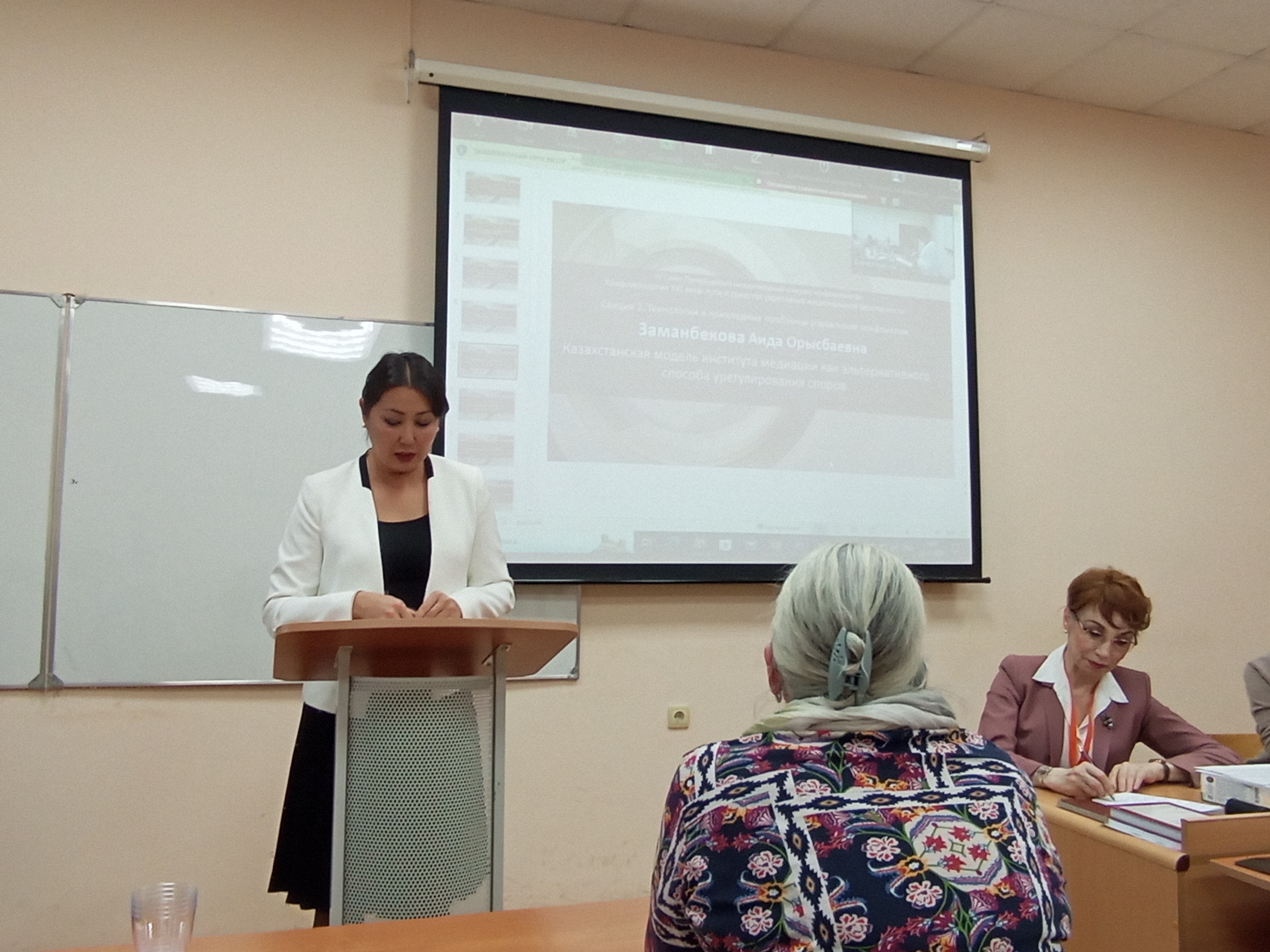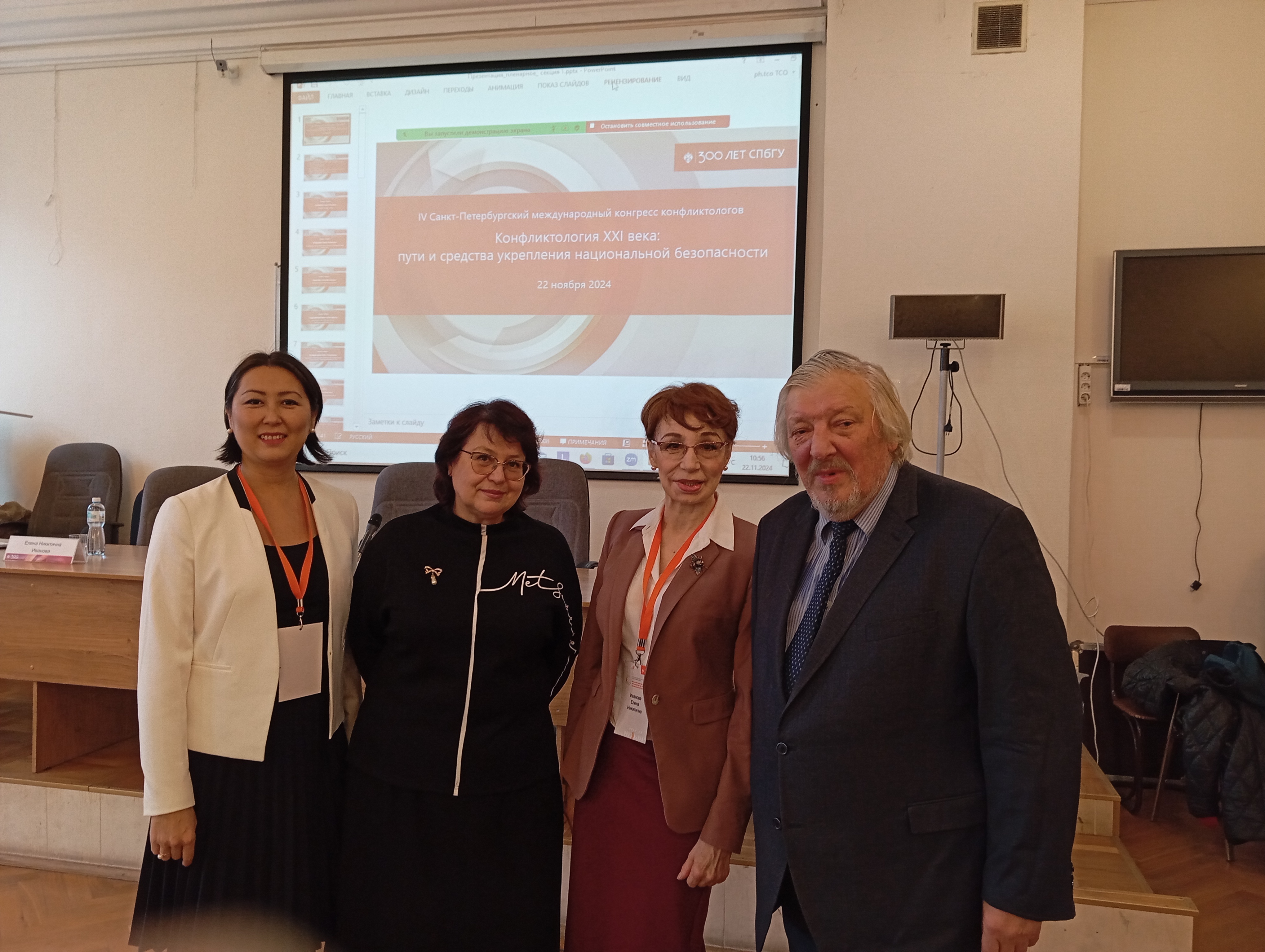On November 22, 2024, within the framework of the IV St. Petersburg International Congress of Conflict Scientists, key issues of modern mediation and conflict management were discussed. The Congress was held at St. Petersburg State University and brought together scientists, psychologists, conflict scientists, mediators, and students, becoming an important platform for sharing experiences and discussing topical issues. The work of the forum was conducted in two sections:
1. Theoretical and methodological understanding of modern conflicts and security.
2. Technologies and applied problems of conflict management.
The Congress raised such topics of modern conflictology and mediation as:
- Mediation: an addition to the judicial system or its alternative?
- Global conflict and prospects of the world order.
- The impact of artificial intelligence technologies on the development of conflict situations.
- On the importance of the agenda in conflict management negotiations.
- The specifics of the mediator's work in the arbitration court: working out objections and many others.\
The coordinator of the NGO MPC Zamanbekova Aida Orysbayevna made a report on the topic "The Kazakh model of the Institute of Mediation as an alternative method of dispute resolution".
The text of the report:
UDC 34.096
Zamanbekova A.O.,
Graduate student of the psychological and pedagogical direction.
Siberian University of Consumer Cooperation,
Novosibirsk, Russia
E-mail: This email address is being protected from spambots. You need JavaScript enabled to view it.
Zhakupov J.A.,
Master of Law Degree,
President
Republican Public Association
"International Human Rights Center",
Almaty, Kazakhstan
E-mail: This email address is being protected from spambots. You need JavaScript enabled to view it.
"The Kazakh model of the mediation institute as
an alternative way to settle disputes"
The Institute of Mediation in Kazakhstan began its path of formation and development since the adoption of the Law "On Mediation" in 2012. For 12 years, the mediation Institute has proven its effectiveness and applicability in the settlement of disputes and conflicts.
According to information published on the website of the authorized body for mediation of the Ministry of Culture and Information of the Republic of Kazakhstan, 12 organizations of professional mediators have been registered in Kazakhstan, which have moved into the category of self-regulating organizations since the amendments to the Law "On Mediation" in 2021 [1].
Every year, the number of mediations conducted increases, as does the number of mediator organizations and the number of mediators themselves. According to the statistics of our Mediation Center of the Republican Public Association "International Human Rights Center", 3,357 mediations were conducted in 2023 and disputes worth more than 9 billion tenge were settled. The effectiveness of mediation procedures was 96 percent.
The bulk of mediation by professional mediators of our center is carried out in civil, administrative and criminal cases at the pre-trial stage and only a small part at the stage of legal proceedings (first, appellate and cassation instances) and enforcement proceedings.
The features of the Kazakh mediation development model are as follows:
- by scope of application: civil, administrative, criminal disputes and conflicts, except for corruption crimes and crimes against the order of management, as well as involving incapacitated and third parties whose rights and interests may be affected. Mediation may also be conducted with the participation of government agencies, if this is expressly provided for in the law.
- by stages of application: at the pre-trial stage, during court proceedings and at the stage of enforcement proceedings;
- by subject: professional (over 25 years old) and public mediators (over 40 years old), including conciliation judges;
- on state regulation: the competence of the authorized coordinating body represented by the Ministry of Culture and Information of the Republic of Kazakhstan;
- on state support: the active role of the Supreme Court of the Republic of Kazakhstan and the activities of conciliation judges and the activities of the Assembly of Peoples of Kazakhstan on the prevention and settlement of interethnic differences.
- according to the system of professional training and advanced training of professional mediators: training under the program "General mediation course" (at least 48 hours) and under the program "Specialized mediation course" (at least 50 hours) and so on.
There are many more features of the Kazakh model of the mediation institute, many of its positive results and moments. But I would also like to focus on those issues that, in our opinion, need to be addressed for the further development of mediation.
The Ministry of Justice is seen as the coordinator of mediation. Lawyers, notaries, CSOs and mediators are specialists in the legal field and persons in private practice. In all CIS countries and abroad, this is the area of coordination of the Ministry of Justice.
Changes are required in the system of regulation of the activities of mediator organizations. To date, just over 10 mediator organizations have gone through the process of transition to the category of self-regulating. And the other 60-70 organizations? Courts and law enforcement agencies should accept mediation agreements only by mediators of organizations that are on the register of the authorized body. All other agreements are illegitimate.
It is necessary to strengthen the role of mediators at the pre-trial stage of dispute resolution, including at the legislative level by making amendments and additions to the current legislation. For example, abroad and in Azerbaijan, mandatory information conversation with a mediator on labor, family, and economic disputes has long been used as an effective tool for pre-trial dispute settlement. In Uzbekistan, investment disputes are necessarily considered with the participation of mediators.
The Concept of mediation and legal assistance has not been adopted and developed with the involvement of all local executive bodies, judicial and other government agencies, professional and public mediators, as well as the Assembly of People of Kazakhstan in their execution. We do not have a Single Code of Ethics for Mediators, such codes have been in place in Russia and Kyrgyzstan for a long time. The Code of Ethics has been in force in our organization since 2012, but does every organization of mediators have it?
The current legislation does not clearly regulate the issues of mediation by mediators when one of the parties is a government agency. The norms of the Administrative Procedural Code of the Republic of Kazakhstan, the Civil Procedure Code of the Republic of Kazakhstan and the Law of the Republic of Kazakhstan "On Mediation" in the current version do not allow us to draw unambiguous conclusions on this issue, which may lead tomorrow to incorrect application or interpretation of legal norms and the consequences of concluding mediation agreements and decisions taken by representatives of state bodies during mediation with the participation of mediators.
It is not possible to ease the tax burden on professional mediators. To date, mediators pay 5 types of taxes and payments, which ranges from 30 to 50% of the amount of income. Contributions to compulsory medical social insurance are also paid by them repeatedly from each type of income. Not all practicing mediators are registered with the tax authorities, this is also unfair to those mediators who pay taxes.
It is necessary to study international experience in the field of mediation, improve the qualifications of mediators for the practical application of modern techniques and technologies, and develop their own innovations based on existing experience and practice. It is important to expand and strengthen our international relations in the Eurasian space, unite for the development of the institute of mediation and develop scientific and practical activities in this field of activity. Mediation has great opportunities for the settlement of interstate disputes and conflicts, the mediation approach can be effectively applied as the basis for a mechanism for conducting interstate negotiations on a neutral territory to resolve disputes and conflicts.
To continue to explore and analyze the possibilities of the Singapore Convention on the Enforcement of Mediation Agreements in order to resolve the issue of its subsequent ratification and application in their countries.
LIST OF LITERATURE
1.Website of the Ministry of Culture and Information of the Republic of Kazakhstan. Register of Mediator organizations as of May 15, 2024:
https://www.gov.kz/memleket/entities/mam/documents/details/663785?lang=ru
All materials of the Congress are published on the website, they can be found by clicking on the link:
https://conflictology.ru/index.php/books/article/view/15274





